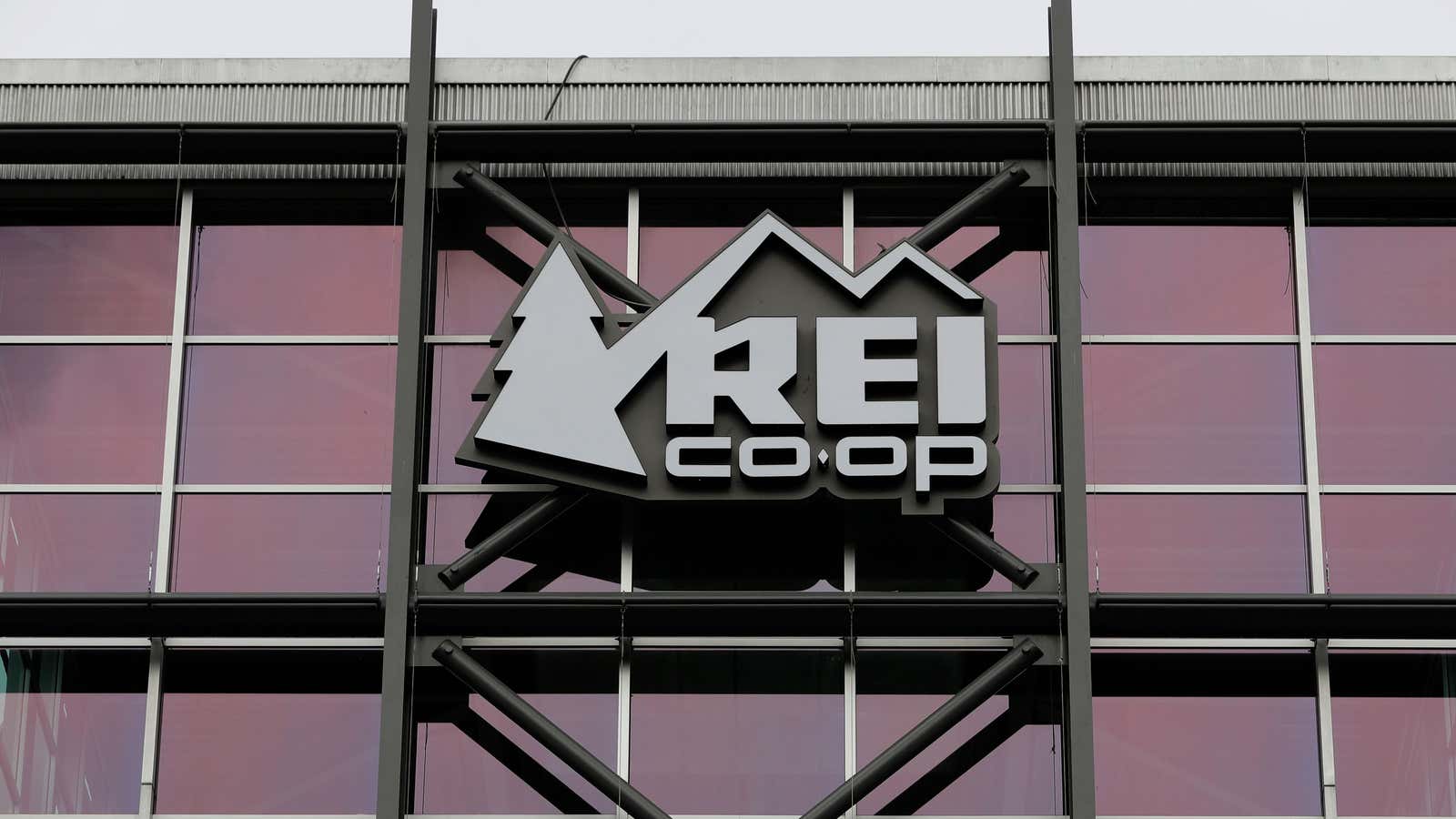REI has an ambitious new plan to ensure sustainability-minded shoppers feel good about buying any product sold in the outdoors- and fitness-supplier’s stores.
For two years, the company has been quietly working with brands it carries to develop and implement a stringent new set of standards covering a range of sustainability issues, such as labor practices, chemical usage, environmental protections, and animal welfare. REI is already rolling out some of the standards, and by the fall season of 2020, it says, every product it sells in its stores and on its website must adhere to them. That includes products from more than 1,000 brands, including big labels like Patagonia.
The new guidelines, which REI published on its site (pdf), include the following:
- Brands must have a manufacturing code of conduct, based on internationally accepted fair-labor practices, that outlines the social and environmental standards for its supply chain.
- In cases where a brand’s products are not regulated by the US Food and Drug Administration or the US Department of Agriculture, it must have a restricted-substances list that meets all applicable regulatory requirements, specifying which chemicals are banned or restricted in its products.
- No bisphenol A (BPA) may be present in products designed to come in direct contact with food or liquids for consumption, such as water bottles, dinnerware, or utensils. The chemical has been linked to a variety of health risks.
- Camping shelters, including tents, hammock shelters, hammocks, awnings, and bivouac sacks, must not contain any of the flame-retardant chemicals REI has designated as potentially dangerous. (REI has compiled a list for manufacturers.)
- Apparel products must not contain long-chain per- and polyfluoroalkyl substances (PFAS). REI says certain PFAS are “persistent in the environment, bioaccumulative in wildlife and humans, and toxic.”
- Sunscreens must be free of oxybenzone, which has been linked to human health risks and can be harmful to the environment when it ends up in aquatic ecosystems, including coral reefs.
- Down insulation must come only from humanely raised ducks and geese that are never live-plucked or force-fed.
- Wool must come only from humanely raised sheep that have not been mulesed.
- No products may contain animal fur or exotic leathers.
- Footwear and apparel brands must complete the Higg Index Brand Module annually and share the results with REI. The Higg Index is a set of tools that lets brands measure their sustainability and identify ways to improve it.
Those are the baseline requirements; REI also noted additional sustainability benchmarks it would like brands to meet, such as Bluesign, fair-trade, and Leather Working Group certifications.
The scope of the project is sizable, and represents a very big ask for REI’s brand partners. “This effort to advance sustainability across an entire vendor base is among the most comprehensive in the US retail industry,” Adam Siegel, senior vice president of research, innovation, and sustainability for the Retail Industry Leaders Association, said in a statement.
Actually ensuring brands abide by the rules may be difficult, though. Just because a brand creates a code of conduct for its supplier factories, for instance, doesn’t mean those factories are following it. Supply chains are notoriously opaque. In fact, REI’s reason for excluding products made with animal fur or exotic leathers is that the supply chains for these materials “lack robust mechanisms to ensure the responsible treatment of the animals and sustainable management of the species from which these materials are derived.”
REI will also rely on brands to essentially police themselves. Greg Gausewitz, REI’s manager of product sustainability, explains that the company will use an annual questionnaire to assess how brands are doing in implementing the new standards.
“We work with brands of many sizes and product categories, so we’ve outlined our expectations and provided guidance resources, but we haven’t mandated the specifics of how those expectations must be met (i.e. number and frequency of audits) within each brand’s unique supply chain,” he says. “Our goal was to frame this in a way that is scalable and feasible for REI and our brand partners.” He adds that as 2020 approaches, REI will look into additional ways to track progress against its benchmarks, as needed.
Still, the company’s loyal clientele will undoubtedly find much to like in REI’s efforts. REI is even making it easier for customers to “shop their values” by letting them search for products on its site according to sustainability attributes, such as “organic” cotton or “responsibly sourced” down.
